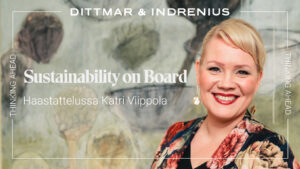We interviewed Partner Hanna-Mari Manninen on the new Sustainability on Board webcast series, in which she discusses sustainability and corporate responsibility with experienced Finnish board members.
Q: Sustainability has become an important theme throughout our society. What aroused your interest in the subject from the point of view of company boards ?
The first reason is the topicality of the subject. Sustainability and environmental, social and governance (ESG) factors have become an important theme on strategic level and for company boards. However, it is not yet fully understood what this means in practice. Or at least there is not enough discussion about it.
The second reason is professional. The regulation relating to sustainability is increasing at a rapid pace. At the same time, sustainability is related to the purpose of the company and the tasks of the board in light of the Finnish Companies Act. Of course, the legislation only provides the framework. At best, sustainability goes beyond law and is much more than mere compliance with the legislation. We lawyers have to understand this development and support our clients with necessary actions.
Finally, the third reason is personal. This topic combines two things that I am very enthusiastic about – sustainability and board work. I was curious to find out how sustainability becomes reality in the work of company boards. Since the best way to learn is to ask, I asked insightful board professionals to share their views.
Q: What kind of perspectives emerged from your discussions with the board members you met for this series?
I was impressed by how strongly everyone feels that the change has already been significant. Sustainability is now clearly a board issue, and it is also understood in greater depth than before. Sustainability must be included in the company strategy. This means that sustainability is not just one point on the agenda of the board or a theme of an individual meeting, but part of the overall decision-making.
In terms of developing board work, everyone agreed that diversity is one important aspect in defining a board’s own success. Different people think differently. The more diverse the organisation is, also at board level, the better solutions are likely to emerge. This is something also nomination boards should take a closer look at.
There were also interesting perspectives related to investors’ expectations regarding sustainability. Investors are demanding company boards to provide more information, concrete measures and indicators – and incentive schemes to promote sustainability on the operational level. I think it is fair to say that investors focus on sustainability if not over then at least along with profit, and sustainable businesses are also expected to be more profitable.
Q: How do you see sustainability evolving and becoming an integral part of companies’ activities in the future?
Companies will get bolder and more assertive. Some companies will undergo a major transformation and their entire business will be directed to serve sustainable development. Also other companies will invest in sustainable innovations and focus on sustainability not because of their brand, but because it is the right – and critical – thing to do, if we want our children to have a sustainable future.
On the board level, strategic focus on sustainability will be strengthened. I believe the board’s attention will also start to shift from history to the future, which means that different forecasts and sustainability perspectives will occupy space from sustainability reporting. Alongside climate and environmental issues, issues of social responsibility and governance are increasingly emerging as well.
Furthermore, I look forward to common standards to take sustainability to next level. There are already many regulatory initiatives that will bring clarity on how sustainability should be defined and reported in different cases. I also anticipate that the term “sustainability” will be supplemented with more precise terms.
Q: Where should the boards of companies with little or no sustainability activities begin the work?
The board must understand what sustainability means in their company and industry. After this, the board must make the necessary strategic changes and ensure that sustainability is integrated into all decision-making processes. As implementation is equally important, it must also be ensured that the board’s interaction with the CEO is working well.
One of the most important things is to demonstrate that the board is committed to sustainability. The board should be on top of all the activities related to sustainability and ethics of the company. For example, it is essential that the board approves the Code of Conduct and other ethical guidelines of the company and has necessary processes in place to monitor the compliance on strategic level.
It is also worth asking for help in addressing sustainability. As attorneys, we have extensive experience in helping boards with issues related to corporate governance and sustainability. Sustainability is not just a legal issue, but it is also a legal issue. In addition to legal expertise, we are familiar with recent trends and market practices.
Q: In your opinion, what would be the best way to continue the sustainability discussion?
The discussion should be continued in different ways and on various levels. Tone from the top is important, but the commitment of each employee and the sustainability culture of each company are equally important. We also need more people who publicly discuss sustainability, also from the boards’ perspective.
At the moment, many companies are using sustainability as a means to stand out. Given the common challenges, companies could also work together and find solutions without competing, as one of the interviewees, Katri Vilppola, put it.
Finally, it is easy to conclude that, in sustainability, words are important, but deeds are decisive – and more should be done.
Sustainability on BoardThe Sustainability on Board series by Dittmar & Indrenius highlights the company boards’ perspective on sustainability. In the series, board members explain how boards should approach the theme of sustainability. The board members interviewed are Varma’s Senior Vice President Katri Viippola, Senior Advisor Jorma Eloranta, Cevian Capital’s partner Niko Pakalén, Managing Director and board professional Jannica Fagerholm, MB Funds’ partner Kimmo Vanne, investment entrepreneur and board professional Salla Pöyry and business leader and politician Christoffer Taxell. The episodes that have been released so far can be viewed through the links below. The series is in Finnish.
|
Episodes:





